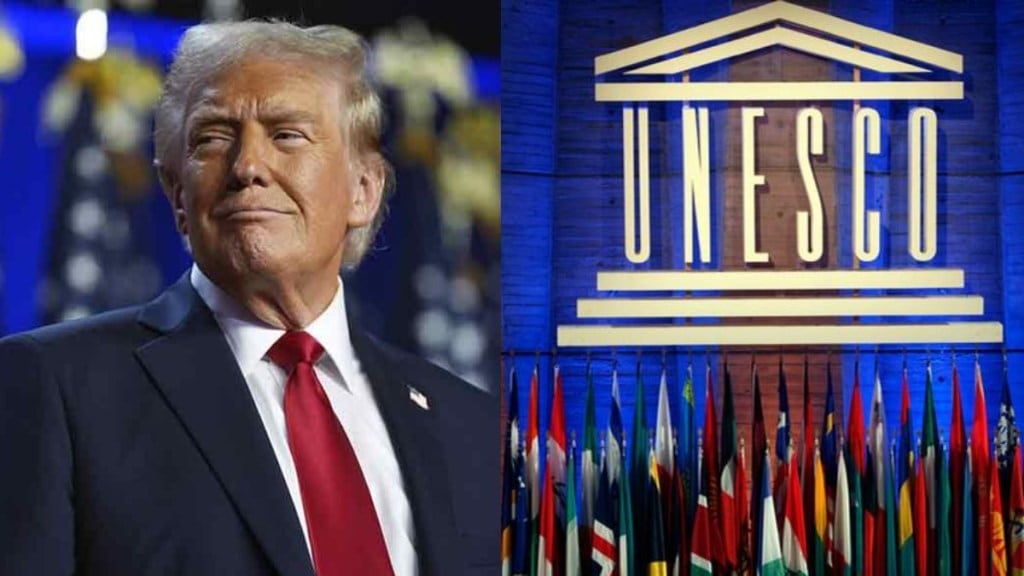The US is set to exit from UNESCO again. This time due to the organisation’s “anti-Israel bias.” In an official statement, Tammy Bruce, State Department spokesperson said, “UNESCO works to advance divisive social and cultural causes and maintains an outsized focus on the UN’s Sustainable Development Goals, a globalist, ideological agenda for international development at odds with our America First foreign policy. UNESCO’s decision to admit the “State of Palestine” as a Member State is highly problematic, contrary to U.S. policy, and contributed to the proliferation of anti-Israel rhetoric within the organization.”
The move, which will take place at the end of December 2026, is a blow to the Paris-based agency. During Trump‘s first term, the US withdrew from the organisation and rejoined during Biden’s term.
Regarding the exit, Head of UNESCO, Audrey Azoulay, on Tuesday said, “I deeply regret President Donald Trump’s decision to once again withdraw the United States of America from UNESCO,” Azoulay said. “However regrettable, this announcement was expected, and UNESCO has prepared for it”. White House deputy spokesperson Anna Kelly also stated that the agency “supports woke, divisive cultural and social causes that are out-of-step with the commonsense policies that Americans voted for in November.”
How will US’ exit impact UNESCO?
UNESCO, the United Nations Educational, Scientific and Cultural Organization, is best known for designating World Heritage Sites such as the Grand Canyon in the United States and the ancient city of Palmyra in Syria. The US was a founding member of UNESCO in 1945 but first withdrew in 1984. The withdrawal was due to concerns over financial mismanagement and an alleged anti-American bias. The country rejoined in 2003 under President George W. Bush, who stated that the agency had implemented key reforms. In February, President Trump signed an executive order mandating a comprehensive review of US funding and participation in United Nations agencies, including UNESCO. White House staff secretary Will Scharf at the time accused UNESCO of harbouring an “anti-American bias.”
At the time of the Trump administration’s withdrawal in his first term, the US contributed around 20 per cent of UNESCO’s total budget. That figure has since declined to approximately 8 per cent. If a full withdrawal happens, it would mean a major loss of financial support for various programmes in education, science, and culture, and other global initiatives.
The ruins of Palmyra in Syria, the Minaret of Jam in Afghanistan, Petra’s Treasury building in Jordan, and several national parks in the United States are among the more than 1,200 World Heritage sites that UNESCO has designated since 1972. Additionally, it maintains a list of the greatest works of human ingenuity, such as the French baguette or Italian opera singing, which is referred to as “intangible cultural heritage.”
UNESCO is well-known for its educational initiatives and does a lot of work to advance equality for women, clean water, literacy, and sex education. It also aids in establishing guidelines on a variety of topics, such as artificial intelligence ethics and ocean conservation.
If the US withdraws their funds, federal support for cooperative programmes with UNESCO may end, which could have an impact on American scientists, educators, and cultural heritage professionals working on these projects, even though US World Heritage Sites will not lose their designation.
After UNESCO voted to admit Palestine as a full member in 2011, the US withdrew its funding. The action was taken in response to US legislation that mandated that any United Nations organisation that accepted Palestine on such terms must completely stop receiving American funding. Due to financial constraints, UNESCO had to cut back on programs and lose almost a fifth of its budget.
What is UNESCO?
UNESCO’s objective is global peace through cooperation in education, science, culture, and communication. According to its website, the Paris-based agency actively combats antisemitism and promotes education about the Holocaust and other genocides. It manages several initiatives, including the World Heritage Fund and the International Fund for Cultural Diversity. UNESCO is one of several international organisations from which the US has withdrawn or cut funding.

